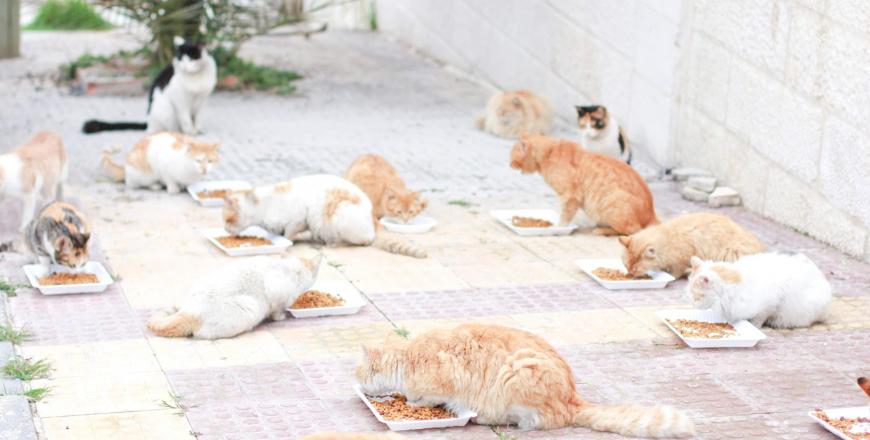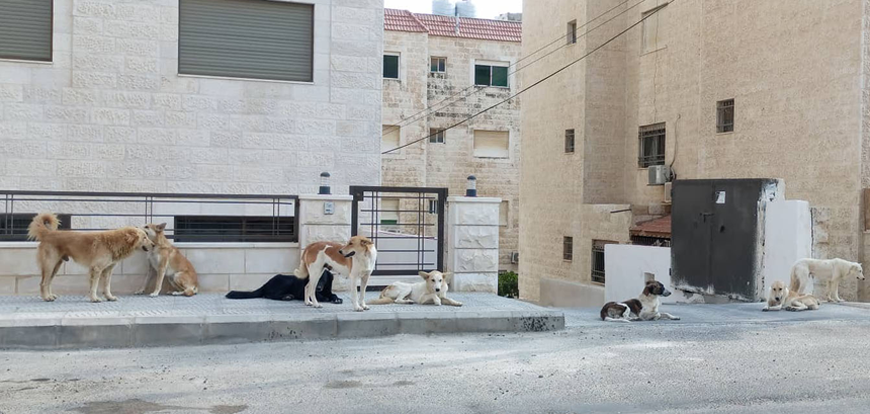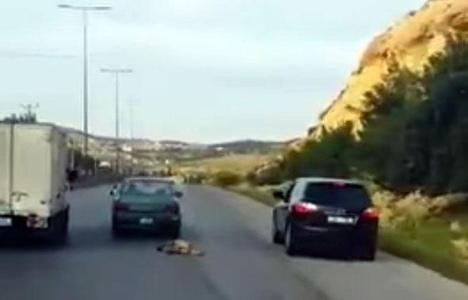You are here
Volunteer initiative tackles Amman’s stray cat population
By Mays Ibrahim Mustafa - Dec 05,2022 - Last updated at Dec 05,2022

AMMAN — The Basboos Project, a volunteer-based initiative, is implementing a Trap-Neuter-Return (TNR) training programme to control stray cat populations in Jordan and improve their living conditions.
Through the TNR method, a cat is humanely trapped, spayed or neutered by a licensed veterinarian and then returned to the place where it was found. Surgically removing the tip of the left ear is the universal sign, indicating that a cat has been through TNR.
The project was founded in 2018 by Nina Smith, an American national, who was living in Jordan at the time.
Smith, who has been an animal welfare and advocacy volunteer for the past 11 years, spoke with The Jordan Times about the project over the phone.
She noted that it aims to“empower” volunteers in local communities to improve the lives of feral and stray cats, which are roaming the streets in “prolific” numbers, through free-of-charge TNR training, access to equipment and discounted veterinary services.
The Basboos Project is currently implemented by Tabanni, a non-profit animal welfare organisation in Jordan.
Rania Sabbah is a Jordanian volunteer on the project who implements the TNR method in her neighbourhood in Jabal Al Hussein, Amman, where she regularly feeds street cats.
“I choose to do this because compassion for all living things, including animals, agrees with our social and religious values,” she told The Jordan Times.
Sabbah believes that TNR offers a “humane, proactive approach to control an endless, rampant cycle of reproduction among street cats”.
A female cat, which starts breeding between the age of four and six months, can birth as many as three litters a year, she said, adding that “survival for street cats can be very challenging as they scavenge for food and water, navigate the perils of urbanisation and suffer painful diseases and injuries”.
The TNR method is a better approach than removing cats from an area by killing or relocating them, which is “cruel and pointless”, as it merely opens up that emptied space for an influx of new cats through a natural phenomenon known as the "vacuum effect”, she added.
According to Sabbah, trapped cats are also given vaccines and provided with flea and tick treatment, which improves their health, increases their quality of life and prevents them from transmitting diseases to other cats or people.
After recovery, the cats are returned to their outdoor homes, as the majority of them are unsocialised and unable to live indoors, she said.
However, “if a cat is sick, injured or suffers from any form of disability, volunteers usually try to find a home for it or continue to take care of it themselves,” she added.
Sabbah, who keeps seven rescued cats at her home,is currently trying to find homes for one blind cat and one three-legged cat. She pointed out that her search has been ongoing for months as the animal adoption culture isn’t very widespread in Jordan.
Hanna Samford, an American expatriate living in Amman, is a TNR volunteer and trainer on the project.
She noted that this method helps make the lives of street cats easier, by relieving female cats from the burden of repeated births and continuous nursing in addition to reducing fights among male cats.
Samford currently keeps two indoor cats and feeds six cats that frequent her building.She also takes care of two cat colonies near her neighbourhood through providing them with food as well as shelter during winter.
“I spend a lot of time and effort doing this, but seeing cats’ happy and healthy makes it all worthwhile,” she told The Jordan Times.
According to a statement by the Basboos Project, joining the TNR programme requires the completion of a three-hour training class. After that, volunteers are given access to safe and humane traps and they’re put into contact with vet partners of the Basboos Project, who offer a reduction on the cost of the procedure. They are also added to a WhatsApp group, through which they can ask questions and share their experience.
Up until now, the initiative has trained 90 volunteers and TNRed a total of 738 cats.The cost of the surgery, which ranges between JD35 to JD48, is covered by volunteers or donations, the statement said.
Related Articles
AMMAN — Stray dogs roaming Jordan’s residential areas remains a significant challenge that requires authorities and citizens to
AMMAN — Greater Amman Municipality (GAM) has said that it has developed its animal welfare measures, using new methods to stop the breeding
AMMAN — During Vetzone’s free veterinary day on October 15, the clinic was able to provide dire medical care to 450 stray dogs and cats in A














